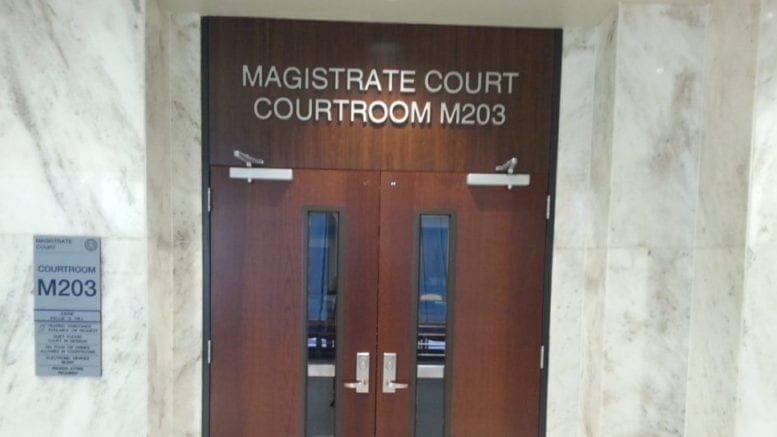The courtroom activity during Monica DeLancy’s eviction hearing on Friday December 20 was largely typical of eviction proceedings.
But on this particular morning, there were only five days remaining until Christmas, and 141 families were facing eviction.
The room was so packed that the bailiff seated defendants in the side benches usually reserved for attorneys.
A large majority of the people being evicted were black or Hispanic, while the majority of the attorneys for the landlords were white.
Eviction hearings take place in Cobb County Magistrate Court, on the third floor.
Judge Michael McLaughlin was the presiding judge.
At 9 a.m. the bailiff told the people in the courtroom what would happen.
She said the judge would call out the name of each person. Since the judge would not look up from his list, the person whose name was announced should shout their presence, or they would be marked as a no-show and a default judgement would be issued in the landlord’s favor.
The roll call began. Judge Michael McLaughlin, looking down at his list, began naming the tenants. If the tenant responded he would name the apartment complex, and the attorney for that complex would announce their presence.
At the end of that process the judge said, “Is there anyone who came in after the names were announced?” He then asked those arriving late to raise their hands and announce their names.
After the long roll call the judge said that since there were so many tenants undergoing eviction proceedings that morning, two of the landlord’s attorneys with multiple cases, and the tenants facing evictions in those cases, should go to the fourth floor.
The remaining people would break into groups of the lawyers representing the landlords, and the tenants facing eviction (and the tenants’ attorneys if they had legal help). The attorneys would attempt to reach an agreement with each of the tenants in turn.
Afterwards, if agreements were reached, the court would file the paperwork. If not, the landlord attorneys and the tenants would face the judge for a decision.
Monica DeLancy’s hearing
Since no agreement was reached between DeLancy and the attorney for Lake Crossing Apartments, the parties in the case stood in front of Judge McLaughlin.
DeLancy was represented by Cristina Dumitrescu, an attorney with Legal Aid of Cobb. The attorney for apartment management was Alain Didier of the law firm Fowler, Hein, Cheatwood & Williams.
Judge McLaughlin said that his powers were limited in a case like this, and asked what each party in the dispute wanted to accomplish.
Both sides stated that the proceedings began when DeLancy and Lake Crossing apartment manager had a dispute over a $75 fee for garbage removal from the front of DeLancy’s apartment. DeLancy said the trash was not hers and refused to pay the fee.
Lake Crossing said they would not renew DeLancy’s lease, and at that point she stopped paying rent and filed for bankruptcy. DeLancy told the Courier that the bankruptcy filing was to delay eviction until her daughter started college in the winter.
Didier said that DeLancy stopped paying rent in May, so the complex was out a total of seven months rent.
Dumitrescu argued that since the writ that resulted in DeLancy’s eviction was improperly issued by the court’s own admission, (see our previous coverage for a timeline), DeLancy should be able to take possession of the apartment.
Didier cited a ruling of the Georgia Court of Appeals, Fennelly v. Lyons, in which the court ruled that although there were irregularities in Fennelly’s eviction, and the writ was vacated, the landlord was acting under a valid court order at the time of the eviction, and had no further liability.
Dumitrescu argued that the circumstances were different in the two cases, but the judge said he would not order the landlord to give DeLancy possession of the apartment.
The judge arranged for DeLancy to have supervised access to the apartment to retrieve her belongings that remained in the apartment.
During the discussion, Didier described the remaining belongings as “garbage,” which visibly upset DeLancy.
What will happen next
In the hallway after the hearing Dumitrescu told the Courier, “We have two orders that are going to be entered. One is going to let Monica get into her unit for two hours on Monday to get her personal property.”
“Unfortunately, the judge is not going to let her move back in pending all of this,” she said. “And what the other order will be is that everything else will essentially just be Superior Court. So if no decision was made today, we’re going to have the Superior Court make a decision.”
DeLancy said in the hallway that the eviction was punitive, and that she was targeted because of her advocacy on behalf of tenants.
Dumitrescu said the scheduled date in Superior Court will depend on what judge is assigned the case, but she is hoping for a January or February date.
Dumitrescu said that DeLancy would be requesting actual damages, punitive damages, including damages for emotional distress.
Contacted via email after the hearing, Didier said since the case was ongoing he would not be able to comment on it.
Lake Crossing apartment management also decline to comment when reached by telephone.





